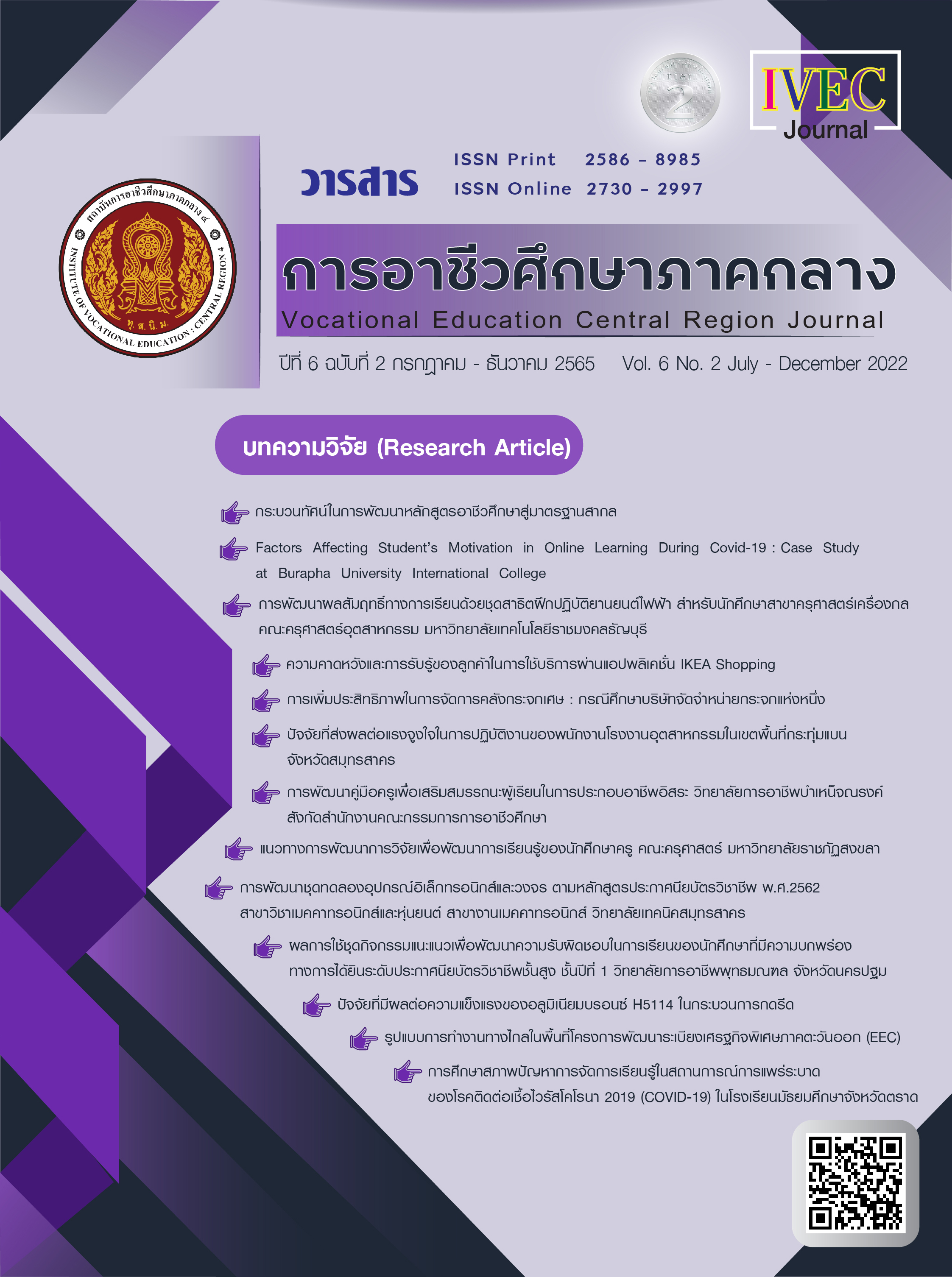Paradigm in Vocational Curriculum Development to International Standards
Main Article Content
Abstract
The purposes of this study were: 1) to examine the current condition of vocational education curriculum development and prepare for a paradigm of vocational education curriculum development to international standards. 2) to prepare a paradigm of vocational education curriculum development to international standards. Information processing were documents synthesis, SWOT analysis and groups interviews with those involved the curriculum of educational institutions under the Office of The Vocational Education Commission in the development of Excellent Center of 120 colleges. A sample of 10 % from 120 colleges was 12 colleges. The groups were divided by subject type and then randomly assigned to the proportion of the number college, a total of 54 students. The results of the study were as follows : 1) a paradigm professional competencies of high quality vocational students included by complete human being, competence academic competence and performance. 2) A paradigm in learning management for the development of high-quality vocational students included by management of active learning in colleges and management of learning in the workplace emphasizes the experience of specialists in the profession. 3) A paradigm management for developing vocational courses to international standards by implementation of curriculum development in line with changing professional standards for proposals to drive the use of paradigms in the development of vocational courses to international standards. It consists of five policy proposals. There were: 1) a proposal for driving a paradigm in the development of vocational courses to international standards by developing competency based curriculum based on learners' professional competence 2) a proposal for driving a paradigm in the development of vocational courses to international standards by providing a variety of learning 3) a proposal for driving the development paradigm vocational courses to international standards by developing teachers and professionals in specific professions 4) a proposal for driving a paradigm in the development of vocational courses to international standards by building a strong cooperation network 5) a proposal for driving a paradigm in the development of vocational courses to international standards by providing supporting factors that facilitate the production of high-quality vocational manpower.
Article Details

This work is licensed under a Creative Commons Attribution-NonCommercial-NoDerivatives 4.0 International License.
|
บทความ ข้อมูล เนื้อหา รูปภาพ ฯลฯ ที่ได้รับการตีพิมพ์ในวารสาร การอาชีวศึกษาภาคกลาง ถือเป็นลิขสิทธิ์ของวารสารการอาชีวศึกษาภาคกลางหากบุคคลหรือหน่วยงานใดต้องการนำทั้งหมดหรือส่วนใดส่วนหนึ่ง ไปเผยแพร่ต่อหรือเพื่อกระทำการใด ๆ กองบรรณาธิการไม่สงวนสิทธิ์ ในการคัดลอกบทความเพื่อการศึกษาแต่ให้อ้างอิงแหล่งที่มาให้ครบถ้วน สมบูรณ์ สงวนสิทธิ์ โดย สถาบันการอาชีวศึกษาภาคกลาง 4 ที่ตั้ง 90 ถนนเทศา ตำบลพระปฐมเจดีย์ อำเภอเมือง จังหวัดนครปฐม โทรศัพท์ 034 242 856 , โทรสาร 034 242 858 ISSN : 3056-9176 (print) ISSN : 2985-2382 (online) |
References
เกริกก้อง มังคละพฤกษ์ และพฤทธิ์ ศิริบรรณพิทักษ์(2561, กันยายน-ธันวาคม). การพัฒนากลยุทธ์การบริหารโรงเรียนอาชีวศึกษาตามแนวคิดการเสริมสร้างค่านิยมในการทำงาน. วารสารร่มพฤกษ์ มหาวิทยาลัยเกริก, 36, (3), หน้า 159-178.
ไพโรจน์ สถิรยากร และพิสิฐ เมธาภัทร (2556, พฤษภาคม-สิงหาคม). การวิจัยและพัฒนากรอบคุณวุฒิแห่งชาติและวางแผนการผลิตและพัฒนากำลังคนตามกรอบคุณวุฒิแห่งชาติ. วารสารวิชาการพระจอมเกล้าพระนครเหนือ, 23, (2), หน้า 456-467.
ภาณัททกา วงษากิตติกุล. (2564). การพัฒนารูปแบบการบริหารจัดการสถานศึกษาเพื่อพัฒนาสมรรถนะผู้เรียนอาชีวศึกษาตามกรอบสมรรถนะข้ามสายงาน (Transversal competencies) ทักษะในศตวรรษที่ 21 ตามความต้องการของภาคประกอบการ. ในการประชุมทางวิชาการ การวิจัยทางการศึกษาระดับชาติ ครั้งที่ 16 “นวัตกรรมการศึกษา : กล้าเปลี่ยน สร้างสรรค์ยกระดับการศึกษา” (25-27 สิงหาคม). กรุงเทพฯ : สำนักงานเลขาธิการสภาการศึกษา.
สำนักงานเลขาธิการสภาการศึกษา. (2560). กรอบคุณวุฒิแห่งชาติฉบับปรับปรุง. กรุงเทพฯ : สำนักงานเลขาธิการสภาการศึกษา กระทรวงศึกษาธิการ.
สำนักสภาพัฒนาการเศรษฐกิจและสังคมแห่งชาติ.(2564). กรอบแผนพัฒนาเศรษฐกิจและสังคมแห่งชาติ ฉบับที่ 13 “พลิกโฉมประเทศไทยสู่เศรษฐกิจสร้างคุณค่าสังคมเดินหน้าอย่างยั่งยืน” (Transformation to Hi-Value and Sustainable Thailand). ค้นเมื่อ ธันวาคม 9, 2564, http://www.ldd.go.th/PDF/DevelopmentPlanNo.13.pdf


